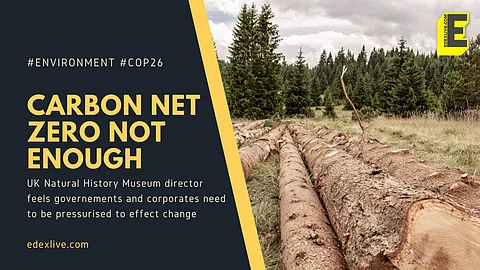

Change will come if we get a lot of people demanding it and I think the time is ripe, says Dr Douglas Burr after speaking about his experience at the recently concluded COP26 summit in Glasgow. "We need to stabilise Earth's temperature but we have cut down all the rainforests and we have poisoned all our oceans. We are not in a good place. It's not enough to steer with a one-dimensional focus to achieve carbon net-zero. We have got to focus on biodiversity as well. The new mantra should be that we have to be carbon net-zero but also be nature positive, " Dr Burr adds. The Director of the Natural History Museum in the UK was speaking as part of the British Council's Great Talks lecture series.
Elaborating more about his experience at COP26 and what he thinks the world is doing to address climate change, Dr Burr said, "Do we have definite, demonstrable targets to reverse climate change after COP26? Not quite. But I think the direction of travel is good. I am more optimistic than I was a few weeks ago but we will see what transpires. There is at least a recognition of the threat now." He says that the involvement of the corporate world at COP26 was particularly encouraging. "I think it's down to all of us to agitate and put pressure on corporates and governments to effect change," he adds.
But it's not all gloomy and we are not too late, says Dr Burr. "There's is still time to reverse the trend of biodiversity loss, one of two threats to the planet. It is still possible to build a world where people and the planet can thrive. We can still allow everyone to have reasonable economic growth and good standards of living but do it in a way that doesn't overuse the Earth's natural resources. However, to do this there's a need for significant change," he says.
But how does one enable change? Through advocates, of course. "It can start by creating people who want change, these people can then get companies to change and then finally can we get the governments to do the things only they can do. Hence, we need advocates for the planet," explains Dr Burr during his lecture. And how can more advocates be created? "People can be changed through programmes that eventually move you from engagement to advocacy. This is about empowering people, making them realise that they have choices - what food they eat, the products they buy and the way they travel. These might seem small choices for an individual but collectively they make a big difference," he says.
